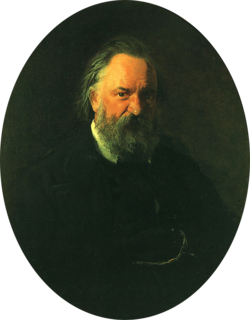Top 46 Quotes & Sayings by Alexander Herzen
Explore popular quotes and sayings by a Russian journalist Alexander Herzen.
Last updated on April 20, 2025.
This socialism will develop in all its phases until it reaches its own extremes and absurdities. Then once again a cry of denial will break from the titanic chest of the revolutionary minority and again a mortal struggle will begin, in which socialism will play the role of contemporary conservatism and will be overwhelmed in the subsequent revolution, as yet unknown to us.
Every man who has lived for fifty years has buried a whole world or even two; he has grown used to its disappearance and accustomed to the new scenery of another act: but suddenly the names and faces of a time long dead appear more and more often on his way, calling up series of shades and pictures kept somewhere, "just in case," in the endless catacombs of the memory, making him smile or sigh, and sometimes almost weep.
People who have realized that this is a dream imagine that it is easy to wake up, and are angry with those who continue sleeping, not considering that the whole world that environs them does not permit them to wake. Life proceeds as a series of optical illusions, artificial needs and imaginary sensations.
Science even more than the Gospel teaches us humility. She cannot look down on anything, she does not know what superiority means, she despises nothing, never lies for the sake of a pose, and conceals nothing out of coquetry. She stops before the facts as an investigator, sometimes as a physician, never as an executioner, and still less with hostility and irony.
It seems to me that you are solving a problem which goes beyond the limits of physiology in too simple a way. Physiology has realized its problem with fortitude, breaking man down into endless actions and counteractions and reducing him to a crossing, a vortex of reflex acts. Let it now permit sociology to restore him as a whole. Sociology will wrest man from the anatomical theatre and return him to history.
A generation which has passed through the shop has absorbed standards and ambitions which are not of those of spaciousness, and cannot get away from them. Everything with them is done as though for sale, and they naturally have in view the greatest possible benefit, profit and that end of the stuff that will make the best show.
The Death of the contemporary forms of social order ought to gladden rather than trouble the soul. Yet what is frightening is that the departing world leaves behind it not an heir, but a pregnant widow. Between the death of the one and the birth of the other, much water will flow by, a long night of chaos and desolation will pass.
If nations always moved from one set of furnished rooms to another -- and always into a better set -- things might be easier, but the trouble is that there is no one to prepare the new rooms. The future is worse than the ocean -- there is nothing there. It will be what men and circumstances make it.

















